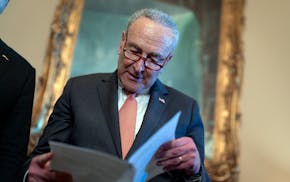Hanging on the wall of the Best Buy store in Edina across from Southdale Center are three identical-looking signs that read: "Thank You for Making This Store the Best," a distinction the company bestowed upon the store for performing well in 2009.
What a difference three years makes. The Richfield-based retailer said this week the store, along with four others in the Twin Cities and a total of 50 nationwide, will soon close its doors. Neither past financial performance nor sentimentality spared the Edina location, first opened in 1973, as Best Buy seeks to cut $800 million in costs over the next three years.
"We are deliberate and thoughtful when we make such decisions," the company said in a statement. "We are working to ensure ... [we serve] all of our customers in a convenient and satisfying way."
Best Buy Co. Inc. CEO Brian Dunn emphasized the company was not retreating from its home market. True, the company will reduce its retail square footage in the Twin Cities by 20 percent. But in that void, Best Buy plans to increase number of locations by 20 percent with a mix of smaller-format stores including Best Buy Mobile and its experimental "Connected Stores" remodels.
"We're going to have more doors and less square footage," Dunn told investors.
Dunn is doing what's necessary for the company's survival, as more consumer electronics shoppers migrate to the Internet, said Dave Brennan, the co-director of the Institute for Retail Excellence at the University of St. Thomas.
"Call it what you want," Brennan said. "They have too much space."
The 50 stores slated to close are probably the worst-performing of the company's 1,100 U.S. stores by way of sales and profits, said retail consultant Flora Delaney. Those closings will lead to the loss of thousands of jobs, as each outlet employs about 100 people. Delaney said Best Buy most likely will shut down many more stores over the next few years as store leases begin to expire.
One reason why Best Buy doesn't need as much space is the weak market for big-ticket electronics like flat-panel televisions. The company's fastest-growing categories are smaller devices like smartphones, tablets and electronic readers.
David Strasser, a retail analyst with Janney Capital Markets, estimates Best Buy will ultimately end up closing more than 200 big-box stores.
"These actions will drive down square footage, improve in-store productivity, and drive up [profit] margins and returns," Strasser wrote in a research note.
How many big-box stores Best Buy will eventually shutter and when will ultimately depend on the success of its "Connected Store" remodels. Those stores feature enhanced in-store pickups of online orders, Pacific Kitchen & Bath and Magnolia Design Center ministores, and a "Central Knowledge Desk" -- a kind of Apple Store Genius Bar where customers can receive tech support and take classes.
Best Buy is testing the concept in the Twin Cities, one of its densest markets, and San Antonio, Texas, one of its least dense markets, to see how customers react. Specifically, Dunn wants to know whether the retailer's normal big-box customers like the smaller stores, do more online shopping, or gravitate toward competitors.
Brennan of the University of St. Thomas thinks customers will like the new smaller formats. Unlike the inpersonal big-box stores, the connected stores will offer "a more pleasurable shopping experience," he said.
Jeremy Brunelli, an analyst with Consumer Edge Research in Stamford, Conn., said the company is essentially trying to replicate the success of the Best Buy Mobile concept into a slightly larger "Connected Store" concept.
The company plans to open 100 Best Buy Mobile stores this year with the goal of reaching 600 to 800 by the end of 2015.
Thomas Lee 612-673-4113
A coffee roastery in Finland has launched an AI-generated blend. The results were surprising
Moscow says 50 Ukrainian drones shot down as attacks spark fires at Russian power stations

The Senate passes a reauthorization of a key US surveillance program just after a midnight deadline
AP Photos: The skies fill with color at a Chinese kite festival
